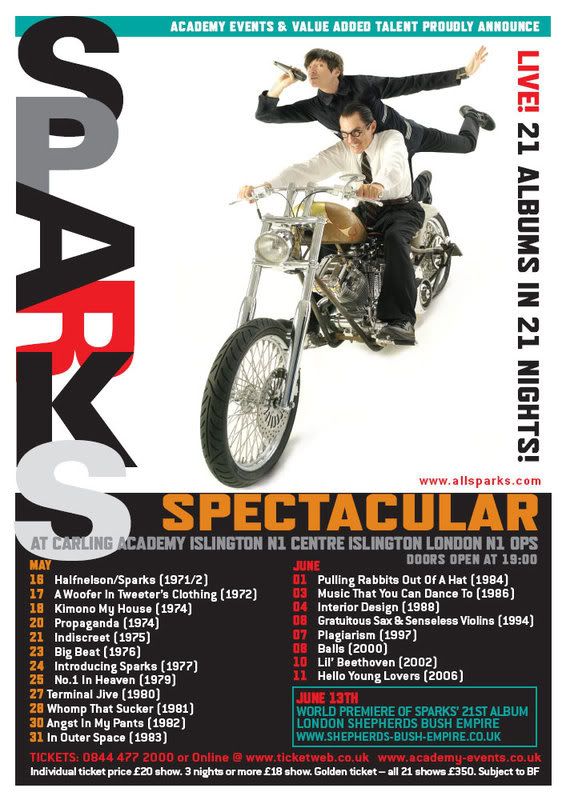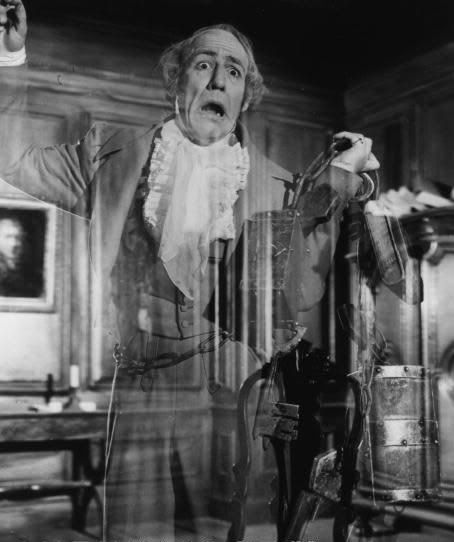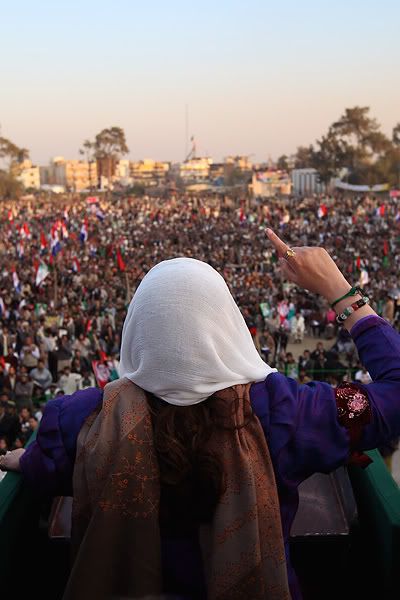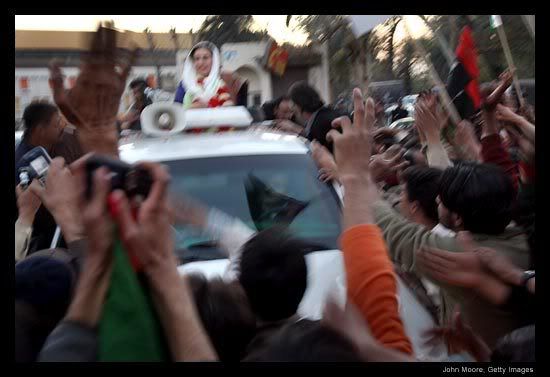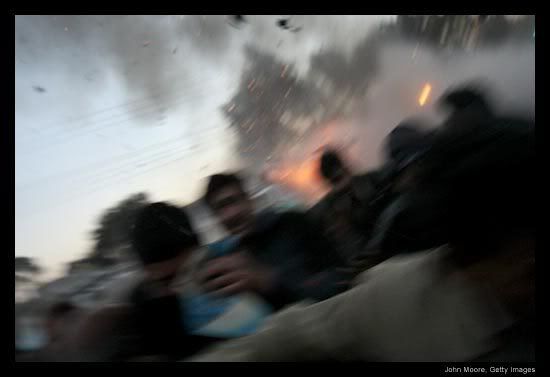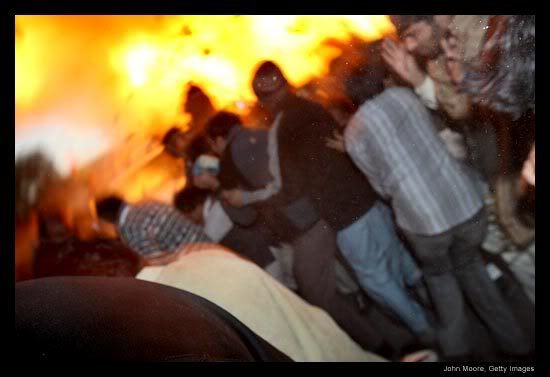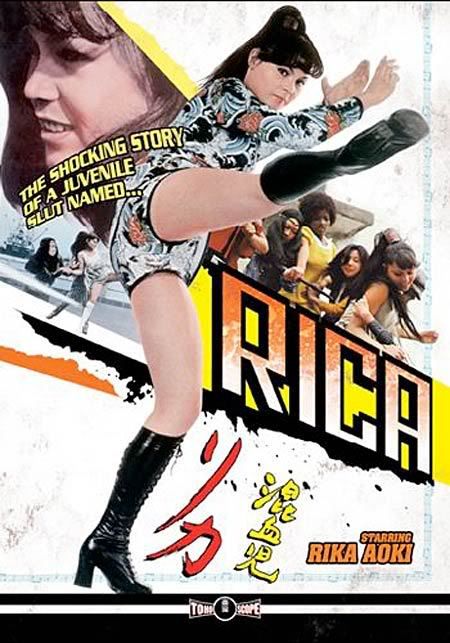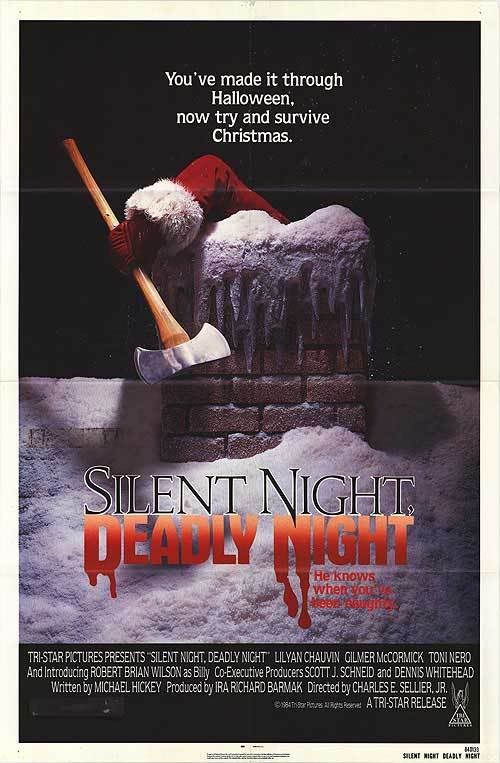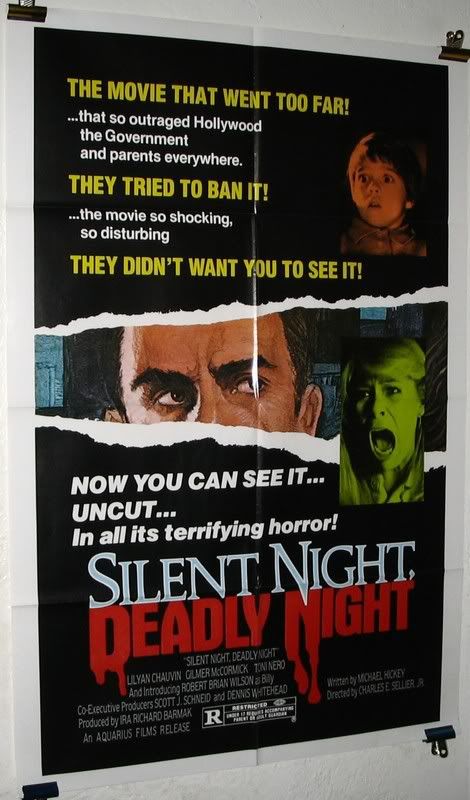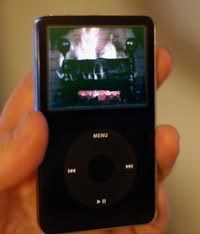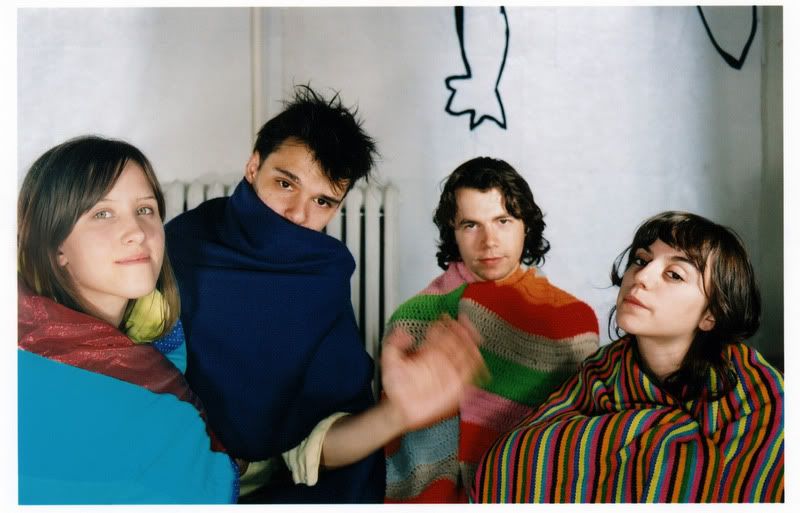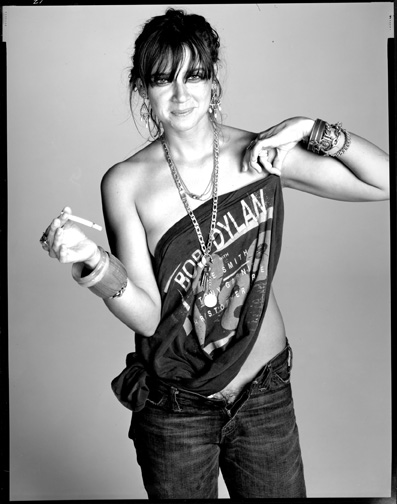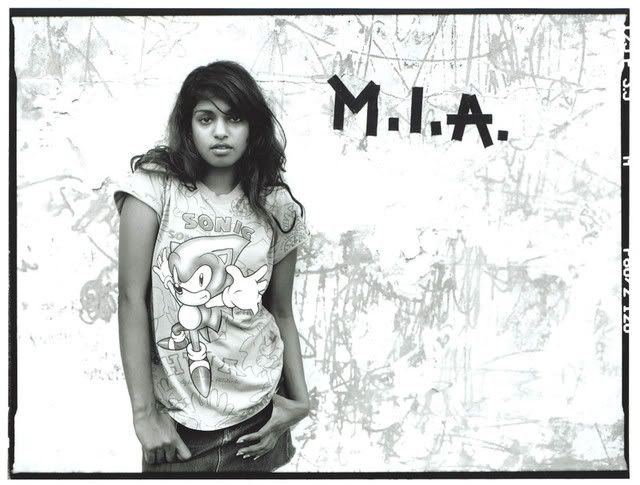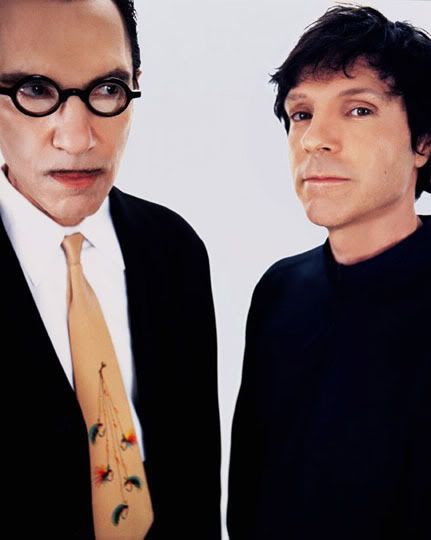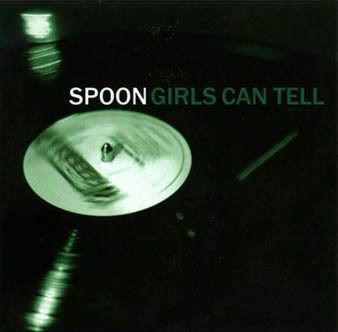 For a profile I wrote in the Times, I interviewed Maya Arulpragasam, a.k.a. M.I.A., at her Brooklyn apartment one hot afternoon last July. It was a few days after the Siren Festival at Coney Island, and later that night she would play Studio B. The gimmick cooked up by me and Maya’s publicist was that I’d hang out while she prepared for the show: sewing her costumes, editing video, whatever.
For a profile I wrote in the Times, I interviewed Maya Arulpragasam, a.k.a. M.I.A., at her Brooklyn apartment one hot afternoon last July. It was a few days after the Siren Festival at Coney Island, and later that night she would play Studio B. The gimmick cooked up by me and Maya’s publicist was that I’d hang out while she prepared for the show: sewing her costumes, editing video, whatever.
Sometimes these tricks are journalistically useful. But this time I was grateful my worst-laid plans were scuttled in favor of real, gimmick-free conversation. (We did wander down the street a little, then she bought a slice of Oreo cookie cake and we plopped down on her couch. She keeps the a/c off — to make the air more Sri Lanka-like, I was told.) She filled up a tape and a half with thoughtful and candid discussion, with no attempt to evade or deliver safe, rehearsed responses.
The piece turned out well, but as often happens with talkative subjects, I was frustrated that so many of her words never made it into the story. But this is why God made blogs, right? So here are some excerpts. Now, M.I.A. has done plenty of entertaining, inflammatory interviews; there are no bombshells here, just room for her to expand on topics that interest her (and me). A note on the text: transcribing interviews is really tedious, and for the sake of time and sanity I usually sketch things out roughly and then return to check anything quoted. So I can’t guarantee that all of this is 100 percent verbatim — sorry, I’m not transcribing again unless someone pays me — but I can give my word that it’s pretty close.
❧1. “My MUM can work with fucking Timbaland if she fucking had the right money”[I asked about the imagery of war and terrorism on her first album, Arular, and whether she thought critics had erroneously characterized her as an advocate for the Tamil Tigers.]It was really, really important for me to stress that at the time when I made
Arular, that was what was going on in society right then and there. Every time you put the TV on, every station you tuned into, every picture, every headline in the newspaper, it was all related to that
[i.e., post-9/11 warfare and violence]. And I think that when the world talks at you so aggressively, then you’ve got to talk back the same way. And it was important to spell things out. But on this record I feel like it’s political enough the fact that I get to make a second record — the fact that I’m even in the music game — the fact that I’m having the issues that I have — the fact that I even get questioned on who I am and what the fuck I’m doing here and shit like that — is enough. It’s still important to me but the battle I have now is also staying by creativity because that actually is also the only thing I have. It’s the only thing I do.
What happened with Timbaland?I guess people expected me to sort of like move into this sort of pop sort of musician. I guess people expected me to make a Timbaland record and become like a — Timbaland wanted to work with me and I thought it was really amazing and flattering because he’s like my idol but by the time I wanted to make a record with Timbaland and got round to getting a visa and doing it, it was already too impossible. And I’d like opened this opened this can of worms somewhere else and I had to go and sort it out. I really felt like that. I just constantly felt like people were going to be a bit disappointed. In England that’s all I kept hearing, whether it was from the label, or I ran into this guy from the NME at a party when I was traveling — the only time anyone ever had anything to say to me it was like, “Wow, you’re working with Timbaland.” It’s like, my MUM can work with fucking Timbaland if she fucking had the right money. Why is it so special? Really, it’s just common sense in the music industry today. If you have the money and you have the checkbook anyone can make records with anyone great.
Well, Timbaland doesn’t work with just ANYONE.Well, Paris Hilton had been there done that, done the rounds. By the time I got to America every fucking amazing producer I could have possibly gone to work with, Paris Hilton had already been there, which just so tainted me. There was just nothing I could do. So you know what? I went and worked with Blaqstarr because he was a bit untouched at that moment, and carried on my doing my thing elsewhere. Because it’s like, you know what? Me and Paris would deliver the same song, right? Because technically they always want me to sing about sex. And guess what? She has more time on her hands to sing about that shit than me. So I’m just going to go back and talk about the bootlegging going on now.
[See below for more of Maya’s interest in the “hustle” of immigrants and the globalized black-market economy.] That was the idea. I felt a lot of disappointment that I didn’t make the whole record with Timbaland. But I thought, you know what? Maybe I’m the last of the — the only the thing that kept me going is that at least I was real. And at least 20 years from now even if I sell one record I can turn around to my kids and be like, I stood by something. So fuck it. Here’s a little table I made earlier. That kind of thing.
I wanted to work with Timbaland because I was curious. They only let me in like a month,
[though she had well-known problems renewing her visa, Maya did obtain permission to enter the U.S. for a short time at the beginning of the Kala project] so I split that time. I did one week with Timbaland where I worked on his album and his song [“Come Around”], which now I have on mine. But at the time I really thought I was going to work on his stuff. He asked me to work on his record. And then I did a week with Danjahandz. And then the rest of the time I was with Blaqstarr. In Baltimore I stayed with Blaqstarr for a bit. He was in and out of jail. That was a long ongoing process to get like one song down. When I did “The Turn” I was with him on New Year’s Eve. We both got drunk. He took me out. And made me shoot a gun. It was New Year’s Eve. And then I got really drunk on tequilas, and that was when we made “The Turn.”
He made you shoot a gun?Mm-hmm.
Where? What did you shoot at?In the streets of Baltimore. Shot it in the air.
How did it feel?It was New Year’s Eve. There was lots of fireworks going off and stuff. And also in Baltimore that’s just the way it is. Where Blaqstarr is and where they live and stuff, it’s like “The Wire.” It really is like “The Wire.” It was quite funny because they were like, “Wait, you want me to get the AK-47 out?” And I was like, “No thanks.”
2. Hustlin’I’ve been thinking a lot about boats. In the beginning of the song [“Hussel”] there’s a bunch of boat pushers in India that we recorded. And it’s them chanting when they pull the boat into the water. And the rest of the song is supposed to sound like a bunch of refugees on the boat, drumming the beat out on the side of the boat. Or a barrel or something. It could be a person, it could be a bootleg CD. I don’t know. But it’s a survival thing.
It’s an American thing. I was thinking about it here. Everyone seems so obsessed with hustling and being on the grind and stuff like that. And maybe it was just the people that I met here and associated myself with. The hustling over here is different because it’s so lo-fi. People are still talking about importing dried fish or something. And that sentiment really goes right up to Jay-Z rapping about how he’s a businessman. And that is the norm in rap music, to talk about business and how you do business. It has been like that for the last 10 years, and if you look at the new scene that is the byproduct of that scene, which is like the hipster blipster scene, that’s the aspect they also draw from that culture, which is all like hustling and grinding. And “we the shit, we the best” ...
It bugs me when I go to Liberia and everyone has to live on, like, a dollar. When I drove past the Firestone village, the whole village — their lifestyle is based around Firestone. And you’re working like 24 hours a day, basically. Even when you have time off you don’t have enough finances to make it out of your Firestone village to go and experience anything. As a kid one of the things that I used to do that made me get to where I am, if I had a pound I’d go off and find new things and experiment and jump on a bus and go to a place I’ve never been before. Go to a party or something, go an exhibition or a museum. I’d just walk into things. I was just thinking about those kids in Africa at the Firestone place. You just spend all day trying to get a drop of rubber to trickle down the tree into this little bag. That process of the glue going down the tree is SO long, you have to dedicate your life to it. And Firestone knows that. They have to make people dedicate their lives to it in order to catch every drop that comes off the tree. And then when you get off and go home, by that time you’re on standby but you’ve only made like a dollar a day. What are you going to do with that money? When you think like that — They do hear 50 Cent, and they do aspire to the only music that they are getting from America, which is, “Every day I’m hustlin’, every day I’m hustlin’.” But it just doesn’t translate in the same way. And if you really are inspiring people to just get your hustle on in places like Africa, then shit, the only way forward is probably through corruption. It’s not like that’s inspiring anyone to think about the good will of the people or build any proper infrastructure or want to work in a hospital, or invent a cure for AIDS. That’s not the type of shit that you’d get from listening to a rap song from 50 Cent.
Is it the kind of thing you get from M.I.A.?No, but if they listen to my shit what I would like them to get from it is that you can do it in one lifetime. You can do whatever you want. ’Cause I came from that Firestone hearth, and I didn’t know how to speak English, but I learnt it and I know it now. I’m just trying to kind of build some sort of bridge.
[Gets up and walks around the apartment a bit. At this point her accent shifts slightly toward the posh.] I’m trying create a third place, somewhere in between the developed world and the developing world.
3. “Every story has two sides”I went [to Liberia] just as a human being. I wanted to see what a country looks like after a war, what hope looks like. How you can actually rebuild, or what the process of rebuilding a country like that would look like. Just because I come from a place that has never seen the end of it. There’s no light at the end of the tunnel. Just to see that it was possible and to say, Look, I’d much rather side with somewhere that actually comes out of it and is optimistic and there is no war going on. And go and learn what I can. And I’d love to represent Sri Lanka. But there just has to be some — it’s so ongoing. It’s so tiring for me to even get my head around what’s going on in Sri Lanka.
It’s so bad. Nobody really talks about the people in Sri Lanka. I hate the fact that when you talk about Sri Lanka everything goes toward the two male kids, the two boys that won’t give up fighting. They’re just too proud to give in. Meanwhile the last thing I was hearing — the town I come from, Jaffna, it’s still got 400,000 people there. And [the army] surrounded it to smoke out Tigers from that area. They cut it off, the only part that connects you from north to south. Cut off import and export, letting people starve to death, letting the population shrink. It’s got nothing to do with the Tigers. As a government they should be better prepared and know their shit by now, or just negotiate and come to some terms. To keep it going like that where it’s always the civilians getting killed...
I don’t even know what it’s about anymore. I don’t even think they know what it’s about anymore. The Tigers use human beings and civilians as pawns as much as the government, but they both do it. Even the political setup and the political party — it has the same principle. They’re both really similar. You’re only as good as your enemy in some sense.
[I asked what she thinks of the Tigers’ methods, including “suicide vests” and conscripting children.]I come from a place that it’s really hard when you ask me that question. Every one of those questions that you ask me, I know 20 other questions [that are about as bad]. How do you feel about a woman getting blown up with a grenade after like 20 army soldiers have raped her in front of her mother? To me to talk about things like that. That’s my point. Every story has two sides. And in Sri Lanka the way I lived and the way I grew up, I didn’t actually live with my dad. I didn’t have any connection to that whole side of it. But as a civilian growing up in a town in Sri Lanka, those are the only stories I knew.
To tell you the truth my fear did come from the government. They did come to my school, they did shoot through the window, they did set my school on fire, they did kill the people I knew. My next-door neighbor is in a wheelchair because he got caught in the crossfire. Those are the things that I know from my firsthand experience.
But the only stories I know about the Tamil Tigers are that, yeah, they take your money, they keep your house if you leave it for more than two years, then they take it over and it becomes Tiger property or whatever. They do it for survival. The stories you hear from them are not like exploitation of power. There’s exploitation of power stories [about the army and the government], which is the thing that strikes me the most. Because when you are supposed to go to the police or you go to the army to protect you from terrorism, and those people are committing the terrorist acts on people, that to me feels way more like you’re stuck in a nightmare than knowing that there are a bunch of crazy guys that are running around, knowing how brutal they are and this is what they do and you just have to avoid them. It makes me feel much safer than knowing the people that are on your side are going to do 10 times worse to you. That’s how I felt.
When I went back to Sri Lanka in 2001, the first time I went there after a few years, I sat on a bus and I got surrounded by like 10 policemen because I was a woman. I was so obviously from abroad: I had, like, streaks in my hair and wore lipstick, and I had jeans on. They all had big machine guns, and they completely surrounded me. When we were going on the bus, it was really rocky because the roads were bombed out and had huge craters, and every time the bus moved they’d all fall on me and they were all groping me and stuff. In front of my mum. And I was crying my eyes out, and my mum was like, ‘If you say anything they’ll only drag you off the bus into the woods, and they would do it to me as well.’ And they’re just like rapists,
[unintelligible couple of words] killers. Because that’s what they do. It’s much better if you just let them fucking feel you up and grope you. I even had a letter from the Ministry of Defense. I had my passport, I had protection letters from the government of Sri Lanka. Even with all those letters they didn’t care. They still did that to me. And I was like ‘Wow, I could be a journalist. Would you still do this to me if I was a journalist?’ And they didn’t care.
Did you ask them that?No, but I took my letter out and I said, ‘What if I was a journalist? I could go and easily report this.’ They just ignored me. They threw the passport back at me and they were like ‘Where’s United Kingdom?’ They didn’t know the difference between Great Britain, the United Kingdom and England. And then it made sense to me. Even the army soldiers, they’re 16-year-olds that the government’s recruiting. It’s not any fucking different with the Tamil Tigers: you’re getting 16-year-olds from villages, and you put them in a uniform and you station them in the jungle for 10 years. They never see women, they never get to go out. The only time they get to go out is when the army soldiers get a monthly pass to
[name of a Sri Lankan city I can’t quite decipher] where there’s hookers, and they get to see prostitutes once a month free. But you go to the 16-year-old, ‘If you join the army we’ll give you free medical, free insurance, free this, free that’ — education or whatever — so everybody goes and joins. It’s like 2 million government soldiers to 10,000 Tamil Tigers. That’s the ratio. But that’s how many guns there are, 2,010,000 altogether. That’s the nature of Sri Lanka.
4. “Kala”To me as a person, when I was going through this album I started believing that what my mom did is actually really big and really great, and 99 percent of the female population lives like that. Like, my mom’s really, really simple, really stripped down. She has survival instincts. And she sacrificed her life to keep three kids alive. She did whatever it took. She never settled with anyone else. She never thought about her own happiness. I was just thinking about single-parent families, their achievements, and how they spread knowledge and how they educate their kids. And what they do is just as powerful as an educated guy in politics that is trying to save the world. I felt like my dad didn’t find a way to do both, to be a good husband and a good leader. And that was something that I had to say. If it could segregate the two existences, then what my mother did is more important. She’s not educated past age 16.
Are you proud or disillusioned about your father?At my age and where I am right now, I have more respect for men who can be achievers that can actually be good husbands and good fathers. To me that actually makes more sense. I want to know if Nelson Mandela was a good husband and a good father. Because from now on that’s how I want to judge a good man.
Download M.I.A.’s “Paper Planes”: “Street Mix” with Bun B and Rich Boy, instrumental.
